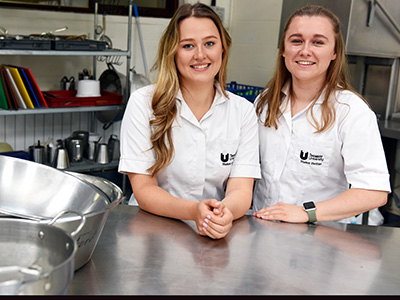Course overview
Student placement experiences
Teesside dietetics student Rachel Howarth shares her placement experience in a learning disabilities setting, and lecturer Steph Sloan outlines the benefits of work placements.
As a graduate you are eligible to apply for registration with the Health and Care Professions Council (HCPC) and the British Dietetic Association, to practice as a dietitian within the UK. This course provides experiences to ensure you are safe and confident to assess dietary and nutritional needs and able to deliver dietary interventions which meet the needs of individuals, groups and populations. Placements are integral to the course – you undertake a minimum of 1,000 hours of dietetic practice in a variety of settings including NHS, public health, research, leadership and charities.
You gain the underpinning knowledge and skills to be able to assess and treat individuals, groups and populations with a number of health conditions which impact on their diet and nutrition. This can include contributing to the care and treatment of people with mental and physical health conditions, autistic people and people with a learning disability.
In semester one you undertake 75 hours of practice, alongside taught academic modules which explore core principles of dietetic assessment and treatment, professionalism, leadership and quality improvement, and core human sciences related to diet and nutrition. In the second semester you undertake 13 weeks of practice placement supervised by qualified dietitians. In the third semester you further develop your dietetic assessment and management, and explore the role of dietitians in promoting health with a focus on public health interventions. You also study research and innovation in dietetic practice, preparing you for your major project in the final semester. In semester four you undertake a further 13 weeks of practice placement. And finally in semester five you undertake your major project.
Top reasons to study this course:
- Contemporary facilities: learn in our £36.9m cutting-edge Bios building featuring state-of-the-art equipment and facilities, including food science laboratories and simulation suites.
- Supportive teaching team: benefit from a dedicated team of registered dietitians who are passionate about creating an inclusive learning environment to support your personal and professional development.
- Collaboration: take advantage of opportunities to collaborate with leading researchers. With strong links to local healthcare providers, you have excellent opportunities to network with clinical colleagues.
- Make a difference: support local patient populations with a range of physical and mental health diet-related conditions during your clinical placements. Get involved with population-based interventions, including those tackling our local food environment, sustainability initiatives and healthy food banks.
- Financial support: study this course and you may be eligible for a £5,000 maintenance grant each year from the NHS Business Service Authority. Find out more. You can also apply for our Placement Support Fund if you are experiencing financial difficulties attending your placement. Find out more.
Supporting information for applicants
Course details
Course structure
Core modules
This module enables you to develop a systematic and detailed knowledge and understanding of the integrated dietetics management to promote the health and wellbeing of people with long-term or life-limiting conditions. This includes children, older people, people with a learning disability or mental health problem and people requiring end-of-life care.
Clinical Correlations of Food and Nutrition
You further develop your knowledge of food and nutrition and how this applies to your dietetic practice, exploring the relationship between the food, biomedical sciences and dietetic practice.
You develop the underpinning knowledge and skills to be able to assess and safely apply effective dietetics interventions, and evaluate their effectiveness for managing individuals across the lifecycle of nutrition, and with disorders of the major body systems.
Dietetics Practice Placement 1
You undertake 75 hours of practice-based experience alongside the taught modules in your first semester. You also undertake a 13-week placement enabling you to apply and further develop your knowledge and skills.
Dietetics Practice Placement 2
You undertake a further 13 weeks of practice placement to further develop your dietetic assessment and management of individuals, groups and populations across the lifespan in a variety of settings.
Dissertation Preparation for Health Professionals
Develop your skills to design and manage research projects relevant to health professionals. You gain a systematic and critical understanding of different research approaches and designs, building your ability to evaluate evidence. Select, justify and use appropriate data analysis techniques to develop, plan and manage a research project that meets ethical standards.
Develop your knowledge and understanding of healthcare, statutory and professional policies, considering their impact on patient care and service delivery. You explore personal and professional development, evidencing this in an e-portfolio. Demonstrate critical reflection and action planning, ensuring that you are prepared for the demands and expectations of your future role in healthcare.
Major Project for Health Professionals
You undertake a research project relevant to health professionals, such as primary or secondary research, systematic review, service evaluation or audit. You will have written your proposal during the dissertation preparation module.
Promoting Health in Dietetic Practice
You explore a range of concepts and issues relating to public health and health promotion for individuals and groups. You discover the principles underpinning behavioural change and how these apply to dietetic practice. You also design a digital resource aimed at promoting the health and wellbeing of a chosen population.
Modules offered may vary.
How you learn
You learn through a variety of learning and teaching methods including lectures, seminars and lab-based sessions. Taught modules are mostly face-to-face, on campus. You also develop an online professional development portfolio to evidence your progress within the course. Your learning is facilitated by lecturers from the School of Health & Life Sciences which means that you benefit from science and health expertise within the University.
Practice placement
You also learn through doing, spending 28 weeks in both clinical and non-patient facing settings across the North East and Yorkshire, where you apply the knowledge and skills gained throughout the course. All practice-based learning opportunities are mapped to the British Dietetic Association curriculum framework and recognise the importance of the four pillars of dietetic practice (professional practice, research and evidence, facilitated learning, leadership). You are allocated a practice educator who, along with dietitians, provides opportunities for you to develop your ability to assess and treat individuals, groups and populations in the practice setting. You also work alongside members of the multidisciplinary team, developing an understanding of each role. Practice placement providers span the North East and Yorkshire, but you are expected to travel for at least one practice placement. You are responsible for any associated travel costs, however eligible students can apply for reimbursement of essential expenses.
How you are assessed
You are assessed in a variety of ways including case-based clinical assessments, written assignments, poster development and oral exams. Modules use formative feedback to help you develop your academic skills. We provide electronic feedback from summative assessments.
Practice placement is assessed as pass or fail by a registered dietitian.
Entry requirements
Teesside University's MSc Dietetics course is a pre-registration programme. Upon successful completion, you will be eligible to apply for registration with the HCPC.
If you are currently working as a dietitian in another country, you may also be eligible to apply for HCPC registration without completing any study, depending on your qualifications and experience. This registration would allow you to apply for health-related job roles in the UK. We recommend reviewing the eligibility criteria to ensure you meet the requirements here.
You apply direct to the University. Our minimum academic requirement is a 2.2 honours degree (or above) in a subject with an acceptable level of human sciences, usually including biochemistry and human physiology. If your honours degree does not contain sufficient human sciences, our Cert HE Health Sciences course can support you to gain core human sciences ahead of applying.
If English isn’t your first language, we require evidence of IELTS Level 7 (or equivalent). No element should be below 6.5.
Shortlisted applicants are invited to attend an interview at the University. An enhanced criminal history (DBS) check may be required for certain modules or placements which involve working with children and/or adults at risk. Where an enhanced DBS check is required, applicants will cover the cost of these checks which can only be processed through the University.
For general information please see our overview of entry requirements
International applicants can find out what qualifications they need by visiting Your Country
Employability
Work placement
Career opportunities
Dietitians work in a diverse range of settings – these include the NHS, private practice, public health, industry, sport, media, research and education.
Practice-based learning opportunities at Teesside enable learners to become confident, flexible health care professionals equipped for today’s health and care workplaces.
Information for international applicants
Qualifications
International applicants - find out what qualifications you need by selecting your country below.
Select your country:
Useful information
Visit our international pages for useful information for non-UK students and applicants.



